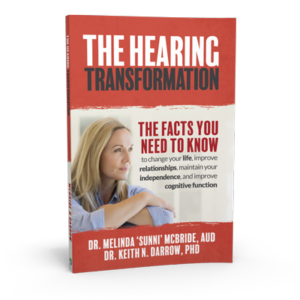
“Hearing aid” is the term we have always used for a hearing device that’s fitted by a hearing specialist to remedy a mild to severe hearing loss. But now we must differentiate between traditional hearing aids and a new type.
Last year, President Biden signed an executive order so that hearing aids could be made available to the general public without the need to see an audiologist. These devices can now be bought online or over the counter (OTC), as long as they meet FDA regulations.
From now on, traditional hearing aids will be termed “prescription hearing aids,” to highlight that they are medical-grade hearing devices. These are the hearing aids we fit patients with at Mission Audiology.
Having two categories of hearing aids can be confusing, so I will share the differences below to help you make an informed decision about which to buy for your hearing needs.
Prescription Hearing Aids vs. Over-The-Counter Devices
One would think that if both types of hearing devices have the words “hearing aids” in them, they would be much the same, but there are some considerable differences between the two. One is prescribed and one is generic.
Hearing test – The biggest difference is in the method used to find out if a person has a hearing loss, and if it is mild, moderate, or severe.
- Prescription hearing aids: A thorough hearing evaluation is done by a hearing professional and it measures audibility levels of specific tones, speech understanding, how capable the brain is at understanding speech in noise, eardrum health, and more. We believe this diagnosis is vital to any hearing treatment, as some hearing loss is caused by just a buildup of earwax, a medical condition, or a result of medication. None of these causes will be caught or treated without this evaluation.
- Generic or OTC hearing aids: A hearing test is not required, but sometimes an inadequate online test is offered, or a professional hearing test is recommended.
Episodic or long-term use – If we were to compare buying hearing aids to buying glasses,
- Prescription hearing aids would be similar to prescription eyeglasses that have lenses made to your correct prescription. They are programmed to your exact hearing needs and are made for all-day, long-term assistance.
- OTC hearing aids are similar to the generic glasses you can buy in a grocery store. They are a good option for people with a mild hearing loss who just need the occasional bit of help for certain situations, such as social events or a meal out, but they are not a good long-term option.
Programmed – For hearing aids to work properly, they should be programmed to precisely heighten your weak areas of hearing.
- Prescription hearing aids are programmed to match your exact volume, tone, pitch, and word recognition needs. They offer fine-tuning options and many styles and models to match your lifestyle. Each ear gets its own finely tuned settings.
- OTC hearing aids are a one-size-fits-all aid. As these are not programmed by a professional, they essentially just amplify sound rather than fine tune to your specific loss. This method of amplification can often cause more damage than good and can result in further damage to the hearing.
Follow-up support and maintenance – OTC hearing aid companies are more concerned about their immediate sales than any care for the consumer later.
- Prescription hearing aids can be brought to us for any cleaning, checks, or small repairs needed, and if they need repairs done by the manufacturer, we can lend you a loner pair of aids while you wait. If you need any assistance or adjustments of your aids, you can have a personal visit with your audiologist who can answer all of your questions and make small adjustments to make the aids comfortable.
- OTC hearing aids must be mailed by you to the seller and then you must wait until they are sent back, with nothing to tide you over in the interim. If you need any assistance or adjustments, you call an 800 number and speak to a receptionist who will try to answer your questions. They cannot make fine tune adjustments. Most OTC aids are incapable of being finely tuned by anyone.
How To Choose The Best Hearing Aids For You
If you are still unsure as to which type of hearing aids would serve you better, we’d be happy to answer all your questions and give you our opinion about all the options available.
OTC hearing aids are a good choice if you have a mild hearing loss that only occasionally needs help, and we would certainly recommend these if they would meet your needs until you decide to pursue prescription hearing aids in the future.
Book a time to come in and make use of our years of knowledge and experience, or call us at (949) 207-7555. That’s what we’re here for. And while you’re here, get a hearing test to see what your hearing needs are. That way, you’ll be much more informed going forward.
We look forward to helping you on your hearing journey.


